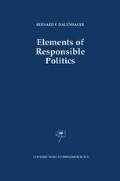Abstract
Tyranny, Aristotle says, either is the worst of politics or is no politics at all.1 And though he does not specifically discuss anarchy, he says that that form of democracy which always appeals from laws to the people is the worst form of democracy. For “such a democracy is fairly open to the objection that it is not a constitution at all; for where laws have no authority, there is no constitution.”2 It is easy then to infer that Aristotle would find anarchy little better than tyranny.
Access this chapter
Tax calculation will be finalised at checkout
Purchases are for personal use only
Preview
Unable to display preview. Download preview PDF.
Notes
Aristotle, Politics, 1266a 1-5, 1293b 29. Hereafter cited as P.
P, 1292a 30-32.
See especially Reiner Schürmann, “Political Thinking in Heidegger,” Social Research, 45, 1978, 191-221, hereafter cited as PTH; “Questioning the Foundation of Practical Philosophy,” Human Studies, I, 1978, 357-368, hereafter cited as QF; “The Ontological Difference and Political Philosophy,” Philosophy and Phenomenological Research, 40, 1979, 99-122, hereafter cited as ODP; and Heidegger on Being and Acting: From Principles to Anarchy, tr. by Christine-Marie Gros (Bloomington: Indiana University Press, 1987), hereafter cited as HBA.
HBA, 288.
HBA, 253.
ODP, 122.
HBA, 288, my insertion.
HBA, 270, 273-275.
HBA, 240.
HBA, 240.
HBA, 242.
PTH, 220; QF, 367; ODP, 101. In this latter piece Schürmann says: “Action … is here not only a consequence of understanding but also its condition.”
HBA, 287.
HBA, 255-260.
HBA, 264.
HBA, 260-264.
HBA, 265-269.
HBA, 270-275.
HBA, 279. My emphasis.
HBA, 280 and 260.
HBA, 280. See also PTH, 115, and ODP, 111-115.
HBA, 243.
Hubert Dreyfus, for example, gives a subtly and importantly different cast to the politics one can derive from Heidegger. Like Schürmann, Dreyfus sees that Heidegger encourages us to resist the “totalizing, normalizing understanding of being” that holds sway in this epoch dominated by technological or technocratic thinking. To resist this totalization, Heidegger, like Foucault, though less radically, calls for the preservation of the “endangered marginal and local.” The call to preserve the marginal and the local is not a call to try to revive some cultural paradigm and its practices, e.g., Greek republicanism, from the past. Rather, according to Dreyfus, Heidegger “would say that we should, indeed, try to preserve such practices, but they can only save us if they are radically transformed and integrated into a new understanding of reality.” And we ourselves cannot produce this new understanding. It can only come to us as a gift. Though we can see what is needed, the only thing we can do about it is to dispose ourselves to receive this new gift. Thus, Dreyfus concludes: “We must preserve the endangered species of practices that remain in our culture in the hopes that one day they will be pulled together in a new paradigm rich enough and resistent enough to give new meaningful direction to our lives. This is what I have called Heidegger's super-passive optimism.” See Hubert L. Dreyfus, “On the Ordering of Things: Being and Power in Heidegger and Foucault,” The Southern Journal of Philosophy, Vol. 28, Supplement, 1989, 83-96, esp. 91-95. See also John Haugeland, “Dasein's Disclosedness,” The Southern Journal of Philosophy, Vol. 28, Supplement, 1989, 51-74, esp. 65-67.
See my The Politics of Hope (London: Routledge and Keegan Paul, 1986) 2-3, 100-101. Hereafter cited as PH.
See Hans Jonas, The Imperative of Responsibility (Chicago: University of Chicago Press, 1984), esp. 6-11.
Sartre describes this devolution in his Critique of Dialectical Reason, tr. by Alan Sheridan-Smith and ed. by Jonathan Rée (London: New Left Books, 1976) I, 345-504.
HBA, 292-293.
HBA, 288-289.
If Schürmann should claim that anarchic praxis simply will befall people, then it is hard to see how his position, if not mere wishful thinking, is not a prediction of some sort. But predictions must rest on positive evidence, not mere negative evidence such as the evidence that the metaphysical era is over.
QF, 367.
HBA, 271.
HBA, 279. My emphasis.
PTH, 221. My emphasis.
See in this connection, ODP, 122.
See Dennis H. Wrong, Power (Chicago: The University of Chicago Press, 1988), 113-123.
HBA, 273. See also QF, 365.
See PH, esp. 102-103 and 142-143.
See Herbert Simon, Administrative Behavior (New York: Macmillan, 1947), esp. 38-39 and 109-119.
Lawrence J. Biskowski, “Contingency, Irony, and Democracy: The Vanishing Citizen in Richard Rorty's Political Thought,” unpublished manuscript, 4. Hereafter cited as CID.
I take this example from Mark Seiden, “Reassessing Maoism in the Light of the Democratic Movement in China,” unpublished lecture at the University of Georgia, May 4, 1990.
See in this connection CID, 18-21.
Author information
Authors and Affiliations
Rights and permissions
Copyright information
© 1991 Springer Science+Business Media Dordrecht
About this chapter
Cite this chapter
Dauenhauer, B.P. (1991). Does Anarchy Make Political Sense?. In: Elements of Responsible Politics. Contributions To Phenomenology, vol 7. Springer, Dordrecht. https://doi.org/10.1007/978-94-011-3564-1_12
Download citation
DOI: https://doi.org/10.1007/978-94-011-3564-1_12
Publisher Name: Springer, Dordrecht
Print ISBN: 978-94-010-5579-6
Online ISBN: 978-94-011-3564-1
eBook Packages: Springer Book Archive

